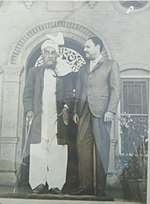Karlal
The Karlal (Urdu: کڑلال), also known as Karral, or Kiraal, are a Hindko-speaking tribe in the Hazara Division, Khyber-Pakhtunkhwa, Pakistan.
Etymology
The Karlal (Urdu کرڑال also known as Kard'al, Karaal, Karhral, or Kiraal) oral tradition states that the tribe is descended from a man named Karral Shah who had migrated to present-day Abbottabad district from the present-day border of southern Pakistan with Afghanistan. [1] [2]
Origins
This warrior tribe trace their descent from Sardar Kallar Shah son of Sujann Shah who was believed to have come from southern Afghanistan, and was a descendant of Alexander the Great. In Haripur and Abbottabad, they are known as Sardars, a name they acquired during the time of the Delhi Sultanate (1206–1296), when the tribal members were made rulers of the Galliyat region of Hazara.
It does seem that throughout the middles ages, the Karlal maintained their independence. During Mughal era (1550-1730), when the Gakkars were trying to extend their authority in the entire lower Hazara from their base in Khanpur, now Haripur District, the leader of Karlal tribe Morcha Kulli Khan at that time was able to murder the Ghakkar chief and retained his tribes independence. Similarly the Turks, whose territory lay to the north, were also never able to extend their authority over this tribe although enjoying sovereignty over large portion of Pakhal Sarkar (an old name of Hazara). In the Durrani period (1740-1800), no attempt was made by Afghan rulers to subdue their territory. However, when the Sikhs captured the lower Hazara region, they tried to gain control over entire lower Hazara including Karlal territory.
In 1822, Ranjit Singh sent a large force under the command of famous General Amar Singh Majitta, who was defeated by Karlals with great slaughter. Amar Singh Majitta was also murdered by the Karlal Chief Sardar Hassan Ali Khan during war that was fought at a historic place of Galliyat named Sumandar Khata. Lepel Griffin, author of a colonial history of Hazara, writes in his book about this battle of Sumandar Khata. From 1822 to 1845 Karlal tribe fought many battles with Sikhs and were able to retain their independence. In 1844 once again Lahore Darbar sent a large force under Diwan Mulraj and Hari Singh to subdue Karlal tribe. Taking advantage of the difficult geographical terrain of their land, the Karlals were able to defeat Sikh army at a place called Nah and killed more than 150 Sikh soldiers.
During the British period at the time of mutiny in 1857, the Karlal tried to revolt against the rule of East India Company, however, British were able to imprison Karlal chief Sardar Hassan Ali Khan and many mutineers of this tribe were hanged along with some Dhund tribesmen (Mutiny Reports 1857 of Hazara District).
In 1946, Sardar Muhammad Zain Khan was elected as a member of All India Muslim League and voted for the creation of Pakistan.
After Pakistan's independence
In 1957, Mohammad Abdul Ghafoor Hazarvi, a Karlal, became the first recipient of the highest civilian award of Pakistan, the Nishan-e-Imtiaz.[3]. This warrior tribe enjoyed cordial relations with other famous tribes of Hazara including Tareens, Jadoons, Abbasi etc.
The grandfather of President Ayub Khan named, Khan Khudadad Khan lived as playmates and comrade-in-arms with Chief of Karlal, Sardar Wali Muhammad Khan and faced together the hazards of a warrior's life. In 1960, Sardar Wali Muhammad Khan was received by President Ayub Khan in president house Rawalpindi which not only pleased the president of Pakistan but also kept alive the great marshal traditions of the time.

.jpg)
In 1988, Sardar Haji Gul Khitab Khan, son of Sardar Wali Muhammad Khan, was elected as the member of National Assembly of Pakistan. He also represented Pakistan in United Nations General Assembly in 1989, where he moved a resolution namely Palestine Resolution. He had the honor to start his speech with the name of Allah Almighty and got the resolution approved in the august house by a majority of 132 free minded nations voted in favor out of a total of 134 votes caste, in spite of the fact that USA and Israel opposed the resolution and voted against.[4]
More recently, the Karlals, along with some other tribesmen of Hazara, have engaged in a political struggle to separate the Hazara Division from Khyber-Pakhtunkhwa in order to form a Hazara Province. Sardar Baba Haider Zaman, the founder of movement of Hazara province, is one of the well known pioneers of this movement [5][6]. The Ex-Provincial Ministers Sardar Gul Zaman, Sardar Ghulam Nabi and the then Chief Election Commissioner Justice (R) Sardar Raza Ahmed Khan also hail from Karlal Tribe.
Most Karlals today are still living in their ancestral villages in the Galiyat and the Nara tract of the Abbottabad District.
References
- Office of the Census Commissioner (1961). Part 2, Volume 12 of Population Census of Pakistan, 1961: District Census Report. c.HAZARA DISTRICT AT A GLANCE.
- Gankovskiĭ, I. (1971). The Peoples of Pakistan: An Ethnic History
- "Nishan-e-Imtiaz for PCCR members". Nation.com.pk. 2011-03-24. Retrieved 2017-08-02.
- (MNA)Sardar Gul Khitab khan speech in UNO..Havelian, retrieved 2020-05-06
- "Movement for Hazara province to be launched in August: leader | Pakistan". thenews.com.pk. 2017-05-07. Retrieved 2017-08-02.
- "Haider Zaman reiterates pledge to work for Hazara province | Peshawar". thenews.com.pk. 2017-04-13. Retrieved 2017-08-02.